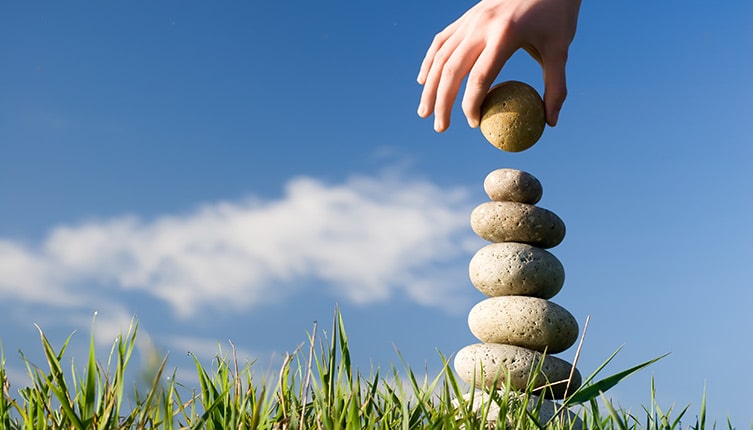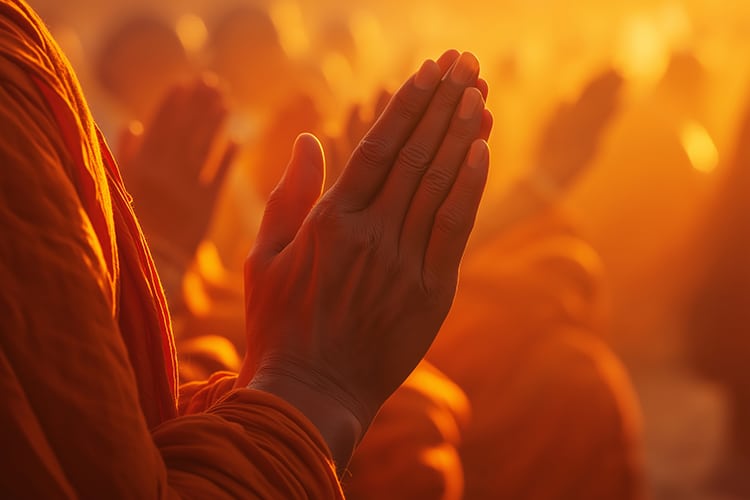What is Meditation Used For?
Category: Beginners Guide to Meditation | Types of Meditation

(Drum roll…)
Meditation is everywhere: schools, community centers, medical centers, in the military, in churches, temples, and ashrams, and the list goes on and on. Seeing as how mindfulness and meditation seem to permeate our culture nowadays, “What is meditation used for?” is a perfectly legitimate question.
The short answer is: developing well-being, focus and awareness. Before we get to a longer answer, we might want to look at what meditation is – and what it isn’t.
What isn’t meditation?
Meditation isn’t about creating another reality, fabricating fantabulous experiences, connecting with invisible worlds or emptying out your mind. Most forms of meditation are pretty down-to-earth. The most wide-spread meditation method in the West is probably mindfulness. Mindfulness isn’t religious and there’s no hocus-pocus: it’s a no-nonsense technique for developing well-being, focus and awareness.
What is meditation?
So you ask, what exactly is meditation? You may be surprised to learn that there are many, many meditation methods. Some are based on teachings from the East that are thousands of years old, while others are quite modern (think: guided meditation app). You can meditate while sitting, standing, walking or lying down; you can meditate while chanting or focusing on the philtrum: that little groove between the upper lip and the nostrils. Your eyes can be open or closed.
What all of the different forms have in common is presence: a willingness to focus on the exercise at hand – mindfulness of breath, guided visualizations, chanting, lovingkindness, etc. – and to let go of the other thoughts and emotions that arise in the mind during your dedicated meditation time.
Why is meditation good for you? Because during meditation you are actually re-wiring the mind. You’re learning that it’s possible to be aware of what’s going on in there and to choose which thoughts and emotions you want to engage with and react to. You’re training in letting go of the others. You’re learning that you can experience well-being simply by remaining present to what is.
At the same time, meditation comes with a host of fringe benefits: it’s good for your health, it improves cognitive functions such as sustained attention, it reduces stress and increases productivity, to name but a few.
What is meditation used for in society?
A growing understanding of the benefits of meditation has led to the expansion of meditation, especially in its secular, practical forms, into many different strata of society. Here’s a very small sampling:
Meditation in schools. Teachers, scientists and social psychologists have direct experience of the benefits of meditation for students. In a hyper-active learning environment, meditation gives kids much-needed quiet time to recognize their thoughts and emotions and also to process them. Kids come out of meditation feeling calm and rested, just like grown-ups do. Studies have shown that meditation leads to more empathetic interactions, less reactivity, and lower stress. One study found that adding a few minutes of mindfulness to an elementary school curriculum for a period of four months led to increased well-being (self-reported), prosocial behavior and even better math results!
Meditation in Business. Many workplaces now provide their employees with meditation rooms so they can switch off and replenish their energy and creativity batteries.
Meditation for Stress Reduction. This is one of the best-known applications of the mindfulness meditation technique in today’s society. Adapted and fine-tuned by pioneer Jon Kabat-Zinn at the University of Massachusetts Medical School, the mindfulness-based stress reduction (MBSR) course and its offshoots have improved the lives of countless meditators by enhancing relaxation and quality of life, and reducing stress and anxiety.
Meditation In Prisons. Several forms of meditation are now commonly offered in prison systems. For example, the documentary The Dhamma Brothers shows the profound impact of an intensive 10-day meditation retreat in a high security prison in the south. The David Lynch Foundation promotes transcendental meditation behind bars. The Prison Mindfulness Institute provides mindfulness-based interventions to prisoners, staff and volunteers. Here too, meditation contributes to well-being, as well as fewer infractions and a documented reduction in recidivism rates.
Meditation programs have also been introduced in law enforcement, sports, and monasteries. Meditation is a useful tool for helping individuals and groups become aware and engaged in social justice movements of all kinds. Meditation techniques have been combined with more traditional therapeutic methods in counseling and mental health settings. Meditation increases resilience of those who work in high-stress environments like emergency rooms. It is a precious ally for those struggling with addiction; regular practice has been shown to decrease likelihood of relapse. The more you learn about what meditation is used for, the more likely you are to want to try it yourself.






